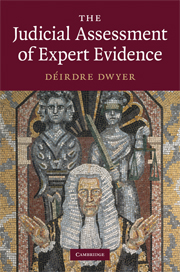Book contents
- Frontmatter
- Contents
- List of figures
- Preface
- Table of legislation
- Table of cases
- Introduction
- 1 General epistemological issues
- 2 Expert evidence as a special case for judicial assessment
- 3 Making sense of expert disagreement
- 4 Non-epistemological factors in determining the role of the expert
- 5 Assessing expert evidence in the English civil courts: the sixteenth to twentieth centuries
- 6 Assessing expert evidence in the English civil courts today
- 7 The effective management of bias
- Conclusion
- Appendix 1 Part 35 of the Civil Procedure Rules 1998
- Appendix 2 Tables of pre-1800 civil cases involving expert evidence
- Bibliography
- Index
- References
3 - Making sense of expert disagreement
Published online by Cambridge University Press: 01 July 2009
- Frontmatter
- Contents
- List of figures
- Preface
- Table of legislation
- Table of cases
- Introduction
- 1 General epistemological issues
- 2 Expert evidence as a special case for judicial assessment
- 3 Making sense of expert disagreement
- 4 Non-epistemological factors in determining the role of the expert
- 5 Assessing expert evidence in the English civil courts: the sixteenth to twentieth centuries
- 6 Assessing expert evidence in the English civil courts today
- 7 The effective management of bias
- Conclusion
- Appendix 1 Part 35 of the Civil Procedure Rules 1998
- Appendix 2 Tables of pre-1800 civil cases involving expert evidence
- Bibliography
- Index
- References
Summary
3.1 Introduction
Chapter 2 provided an argument that the court as tribunal of fact possesses a limited epistemic competence to assess expert evidence. When the court determines the facts of the case before it, it is able to draw a limited set of justified inferences from the evidence presented by experts. It might reasonably be suspected that this is in some sense cheating, because, although there are some concerns about whether the courts can form such justified inferences, the more prevalent concern is whether the court is able to do so when confronted with conflicting expert opinions. This is not cheating, however. The question of epistemic competence has been considered as a necessary preliminary point in Chapter 2, in the same way that Chapter 1 spent necessary time laying down the foundation of the epistemology adopted in my argument, so that in this chapter it is now possible to turn to examining in greater detail the specific problem of how the courts are to decide where the expert evidence in a case offers more than one interpretation.
The body of the chapter is divided into five parts. In Section 3.2, I examine why legal and expert communities differ in their attitudes towards disagreement in drawing inferences from facts. The two main areas for disagreement concern, first, which set of generalizations (which we might call a ‘theoretical framework’) should be applied to a given set of base facts, and, secondly, how those generalizations should be applied to those base facts.
- Type
- Chapter
- Information
- The Judicial Assessment of Expert Evidence , pp. 133 - 179Publisher: Cambridge University PressPrint publication year: 2008



